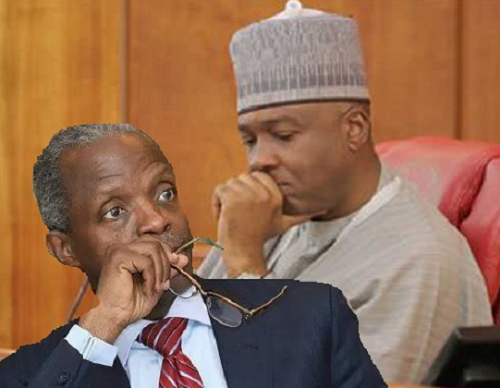News
Senate has power to reject Magu’s nomination and it stands – CLO
Published
9 years agoon
By
Olu Emmanuel
- Says Executive must abide by constitutional democracy
The Civil Liberties Organisation (CLO) has admonished the Presidency to end the unnecessary feud with the Senate over the appointment of Ibrahim Magu as Executive Chairman of the Economic and Financial Crimes Commission (EFCC).
Comrade Ibuchukwu Ohabuenyi Ezike, CLO Executive Director, in a statement indicated that the CLO has watched with keen interest and serious concern, the raging crisis between the Presidency and the Senate of the Federal Republic of Nigeria over the rejection of Magu’s confirmation by the Senate and the subsequent partisan interpretations by some stakeholders in the country. “This ugly development, we must confess, is not palatable for good governance and our emerging constitutional democracy,” Ibuchukwu declared.
Details of the CLO statement read:
The rejection of Ibrahim Magu, as the substantive Chairman of the Economic and Financial Crimes Commission (EFCC) by the Senate of the Federal Republic, is the major cause of this misunderstanding. President Muhammadu Buhari had presented Magu to the Senate for screening and subsequent confirmation as the substantive chairman of the Commission. But unfortunately, after Magu appeared before the Upper Chambers for screening, his confirmation was declined by the Senate. The Senate communicated its reasons for the disqualification of Magu to Mr. President pointing out why his appointment would not be confirmed by it (the Senate). The Red Chamber had heavily relied on the report authored by the Directorate of the State Service (DSS) on Magu to decline his confirmation for the EFCC top job.
However, not satisfied by the Senate’s reasons, the Presidency represented Magu the second time for consideration by the Red Chambers. Similarly, after due consideration of Mr. President’s communications and adduced reasons why the Senate should reconsider Mr. Magu, the candidate was, again, disqualified.
Since this period, both parties have maintained calm while Magu has continued to act as the Chairman of the EFCC and playing the roles of the Chairman without recourse to the consummation of the due process of the law in this respect. The presentation of the Acting Chairman of the EFCC to the Senate for confirmation by Mr. President is in the exercise of the Provisions of Section 2 (3) of the EFCC Act and certain provisions of the 1999 Constitution as amended that conferred such powers of confirmation of appointees in the status of the Chairman of the EFCC by the Senate.
Since the Senate rejected Magu’s candidacy as the Chairman of the EFCC, there has been a cat and mouse relationship between the Presidency and Senate. In the same vein, some highly and lowly placed Nigerians, the Presidency and some members of the civil society community have taken partisan position on the issue without first looking at the position of the law vis-à-vis the powers of the Senate nay the National Assembly in a constitutional Democracy before taking sides. The members of the Upper Chamber have been called names and insulted by some Nigerians who feel unhappy with the position of the Senate on the mater, and who may have wanted the National Assembly and, as it relates to this matter, the Senate, to become a rubber stamp legislature that would be massaging the ego of the Presidency.
ALSO SEE: Senate draws battle line with Presidency over Magu
Our Questions.
One question that CLO would like to ask is, does the Senate have the powers to screen and confirm the appointment of the Chairman of the EFCC? Have previous chairmen of the Commission been screened and confirmed by the Senate? And the answer is yes.
And the second question; has the Presidency the powers to retain any nominee whose name was forwarded to the Senate for screening and confirmation after s/he was not qualified by the Upper Legislative Chamber for that position? Our answer is No; doing so would mean disrespecting the position of the Senate and, by such ignoble act, infringes on the provisions of the Separation of Powers which helps to prevent anarchy and impunity in a constitutional democracy.
Third, must the Senate provide reasons why such proposed appointees should be disqualified? The answer, again, is No. No provisions in the Constitution or any other law says so.
CLO’s Opinion.
In our view, the Senate of the Federal Republic of Nigeria has powers to confirm or reject the appointment of the Chairman of the EFCC as, indeed, any other nominees whose particulars are forwarded to the Senate for consideration for appointment by the Presidency. The 1999 Constitution, as amended, confers the powers to screen and confirm the appointment of the Ministers of the Federal Republic and Chairpersons and members of certain Boards and Commissions of the Federation for appointment by the Presidency. In the case of the appointment of the EFCC chairman, the EFCC Act and certain sections of the 1999 Constitution, as amended, confer such powers on the Senate. In conclusion, therefore, the Senate has the powers to reject Magu’s nomination and it stands.
Must it be Magu?
CLO notes with sense of clarity that, both in the past and present, certain persons nominated for appointment have not been confirmed by the legislatures in Nigeria either at the Centre or the states. And in such cases, those entities were withdrawn. Neither did the earth sink nor did Heavens fall. So, why must it be Magu? CLO does not find any justifications why EFCC or Nigeria should collapse because a Nigerian among over 170 million citizens is not confirmed by the Senate and, therefore, could not be appointed the Chairman of the Commission? Even if the Senate does not find any genuine reasons for not confirming the appointment of a nominee into a public office, it is NOT enough reasons why Nigeria must sink. There are, at least, thousands of other Nigerians who competently qualify to assume such office. The continued insistence on Magu is strange and may have other hidden primitive reasons for this agitation for Magu. Absolutely so.
ALSO SEE: What Saraki, Magu relationship was before Buhari came in
Our Fears.
The fears of the CLO on this crisis is that this may degenerate into a situation where the Senate may pass a resolution to block all the executive communications to it and the NASS, including the Appropriation Bills, till its position on Magu is fully respected and implemented by the Presidency. If this becomes the case, it would adversely affect the functionality of governance, and, therefore, would heighten the suffocating repressive economic hardship in the country that makes life unbearable for poor citizens.
We will recall that the 7th Senate took similar position on Dr. Goodluck Jonathan’s Presidency in the wake of the harassment of the former Governor of Rivers state and Minister for Transport, Mr. Rotimi Amaechi, by Mr. Joseph Mbu, then Police Commissioner in that state. The Senate passed a resolution not to entertain any communications from the Presidency till Mr. Mbu was posted out of Rivers State. Similar proclamation by the Senate will adversely affect the flow of governance in Nigeria.
CLO’s Appeal
In view of the foregoing, CLO appeals to the Presidency to reconsider its position on the insistency on the appointment of Magu as the substantive Chairman of the EFCC and yield to the desires of the Senate. This, in our thinking, will create conducive atmosphere for peace and understanding between the two organs of government which would enable the government to deliver on its promises to the people. In another development, CLO makes bold to say that, though, Nigerians have right to speak out against the actions of their leaders, CLO frowns at certain uncomplimentary comments being made by come Nigerians on the personality of the Senators cum the ill-conceived advice to the Presidency to disobey the Senate’s position on Magu’s confirmation as this would be counter-productive. We recall that in the aftermath of the crisis that arose between the former governor of Rivers State, Mr. Rotimi Amaechi and then Commissioner of Police in the state, Mr. Joseph Mbu, the National Assembly had passed a Resolution to block all the executive communications before former President Jonathan ordered the recall of Mbu from Rivers state. Senate’s similar proclamation on this Presidency coupled with the current serious national crisis in the country, would cripple governance an adversely affect the people.
You may like


FG Launches Ports Customs Efficiency Committee to Boost Trade, Cut Red Tape


EFCC arraigns 16 suspected internet fraudsters in Enugu


Senate to Meet Attorney General on Tax Reform Bills Disputes


Finally, EFCC arrests former Kogi Gov Yahaya Bello


Supreme Court reserves judgment in 19 states’ suit challenging EFCC legality


EFCC not constitutionally established agency – Agbakoba
Trending

 Business1 week ago
Business1 week agoNaira mixed across markets as official window dips, parallel market strengthens

 Football1 week ago
Football1 week agoUCL Playoff: Gordon scores four as Newcastle thrash Qarabağ 6-1

 Entertainment6 days ago
Entertainment6 days agoSinger Simi faces backlash after TikToker admits to false rape allegation

 Latest1 week ago
Latest1 week agoLegal constraints, not connectivity, delay electronic results — Igini

 Entertainment3 days ago
Entertainment3 days agoSimi addresses resurfaced 2012 tweets amid online backlash

 Latest1 week ago
Latest1 week agoTinubu defends electoral reform, downplays mandatory real-time upload

 Business1 week ago
Business1 week agoThree Crowns Milk launches nationwide Ramadan campaign to promote heart-healthy nourishment

 Comments and Issues6 days ago
Comments and Issues6 days agoNigeria’s Declining Oil Output and Soaring Foreign Portfolio Investment Inflow

